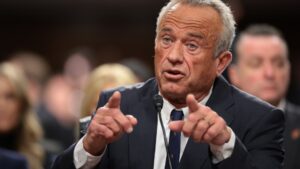A Healthier Future: Robert F. Kennedy Jr.’s Agenda at the Helm of HHS
In a striking new chapter for the U.S. Department of Health and Human Services (HHS), Secretary Robert F. Kennedy Jr. has laid out a bold vision aimed at transforming the nation’s food system. Here at Extreme Investor Network, we aim to provide you with insights and updates that matter. Today, we focus on a crucial initiative that could significantly impact public health and corporate responsibility in the food industry.
Setting the Stage for Change
At a recent Senate Finance Committee confirmation hearing, Kennedy emphasized his urgent commitment to removing the "worst ingredients" from the American food supply. This aligns with the Trump administration’s focus on public health, and it could represent a major shift in how the government regulates food safety and nutrition. This initiative isn’t just about better food—it’s about rethinking the very fabric of what we consume.
Kennedy’s vision extends to eliminating artificial dyes, a long-standing issue that has been at the forefront of health debates. According to a memo from the Consumer Brands Association, which he shared with food executives, Kennedy aims to eradicate these harmful additives by the end of his tenure. In his call to action, Kennedy expressed a willingness to collaborate with the food industry but made it clear that he is prepared to enforce regulations if companies do not act proactively.
Engaging Industry Leaders for Healthier Choices
The meeting, attended by top executives from major food companies like PepsiCo, Kraft Heinz, and General Mills, was described as "constructive." Melissa Hockstad, CEO of the Consumer Brands Association, noted the importance of ongoing dialogue to bolster public trust and promote healthier choices among consumers. The food executives responded positively, acknowledging that change was not only necessary but also in alignment with growing public demand for healthier products.
What sets Kennedy’s approach apart is his focus on building a collaborative relationship with food producers rather than imposing blind regulations. This willingness to engage and work alongside the industry offers a unique opportunity for businesses to harness the growing ‘health consciousness’ trend among consumers.
Fighting Chronic Disease with Nutritious Food
With a focus on making nutritious food central to public health, Kennedy argues against the alliance of food and drug companies, claiming that they have contributed to a chronic disease epidemic in both children and adults. His rhetoric speaks to a larger movement among health experts who advocate for dietary changes as a preventative measure against diseases.
As part of his health policies, Kennedy plans to scrutinize the regulations surrounding popular food additives—a move already set in motion by the FDA’s recent revocation of the authorization for Red No. 3, a dye linked to cancer in lab animals. The emphasis on nutritional food over pharmaceutical remedies reflects a significant policy shift that could reshape consumer behavior and corporate practices.
A Watchful Eye on Vaccination Policies
However, Kennedy’s tenure is not without controversy. Known for his skepticism towards vaccines, he has indicated plans to review the childhood vaccination schedule, which raises concerns about public health policies at a critical time when vaccination rates are declining. This approach has sparked debates within the health community about the balance between parental rights and the need for herd immunity.
What to Expect Going Forward
The implications of Kennedy’s policies are extensive. With a budget of $1.7 trillion, HHS oversight spans food safety, drug approval, scientific research, and healthcare delivery. As the department navigates its new initiatives, both the food industry and public health advocates will be watching closely.
At Extreme Investor Network, we believe that these developments not only reflect a shift in health policy but also signal potential opportunities for investors, especially in sectors focusing on health foods and sustainable practices. As the conversation around public health continues to evolve, it is crucial for businesses and consumers alike to stay informed and engaged in these transformative efforts.
Stay tuned as we provide ongoing coverage of this pivotal moment in public health and consumer safety. Together, we can build a healthier future—one informed choice at a time.

